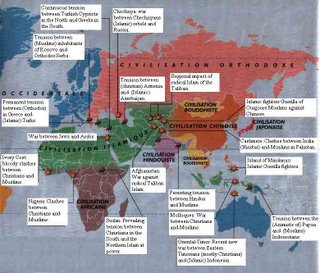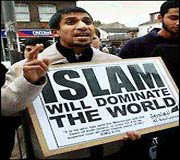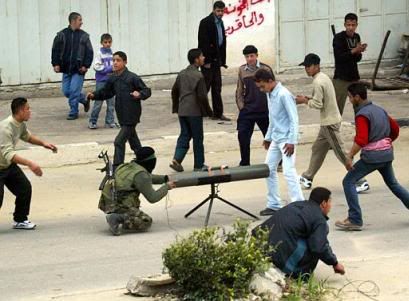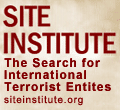Jihad and Genocide
NER ^ January 2010
Richard Rubenstein: ‘Jihad and Genocide’ a review by Bat Ye’or (January 2010)
In Jihad and Genocide, Richard Rubenstein discusses and clarifies the most important issues of this century. Having written a number of books on the political and cultural processes that led to the genocide of the Jews in World War II, he now detects in jihad the same dynamic targeting Israel.
Most Westerners ignore the meaning of dhimmitude and Islam’s dichotomous division of the world into dar al-Islam (the land of Islam) and dar al-Harb (the land of war). Yet those concepts are fundamental pillars of jihad and encompass the entire Islamic worldview. They affect both everyday life and the future of the West, as is evident every time an airline passenger submits to an intrusive search before boarding a flight. In our nuclear age, these concepts will determine the preservation of our freedom and ultimately of humanity’s survival. In reality, today’s jihadist genocidal rage targets more than Israel. It targets the entire civilized world.
Using primary sources, religious injunctions, and related modern literature, Rubenstein exposes the universality of the jihad threat. Muslims are under the religious obligation to expand the abode of Islam by war, by peaceful means such as immigration, and da’wa (proselytism). Islamists believe global peace can only be achieved through the worlwide domination of Islam. With scholarly objectivity and balanced arguments, the author analyses the structure and implementation of jihad deployed in time and space. He underlines the two opposing interpretations of jihad, the Muslims and the non-Muslim. The Muslim sees jihad and its consequence – Islamization – as a benefit for humanity. They judge resistance of non-Muslims to Muslim forces to be a criminal war against Islam that prevents universal obedience to Allah’s injunctions. That principle dominates contemporary Islamist international policy and is used to justify its hatred against Israel, regarded as guilty of defending itself, as well as its accusation that America is itself guilty of 9/11 for its “sinful” opposition to Islamist imperialism. Similarly, western opposition to Islamization and the alleged sin of “Islamophobia” are condemned as crimes.
Rubenstein examines the genocidal potentialities of jihad in the writings of Sayyid Qutb, one of the most influential radical Islamist thinkers. He stresses Qutb’s view that jihad is not a territorial war that can be solved by diplomatic compromise. Islamists regard Jihad as a war for Allah that aims at bringing the whole of humanity under Allah’s law. In this view, the non-Muslim world is characterized by jahiliyya, defined by Qutb as the “state of ignorance of the guidance of Allah.” According to Qutb, jahiliyya is the condition of a sub-humanity condemned to disappear. Qutb belonged to the Muslim Brotherhood movement, one of today’s most powerful organizations that propagates his teachings worldwide. These views are shared by the Organization of the Islamic Conference (OIC) that unites 57 Muslim countries and whose ultimate aim is the re-Islamization of the universal Muslim community and the restoration of the Caliphate as a global Islamic empire. This trend explains the return of some shari’a laws in Indonesia (e.g. stoning adulterers in Aceh), and the pro-Islamist evolution of Turkey. Although Qutb’s heirs may diverge on the tactical steps necessary to achieve the global Caliphate, their jihadist activities spread terror and massacres worldwide, including violence against Muslims judged insufficiently religious.
[...]
World war II…
After the war, the massive social, political, economic and intellectual links between unreconstructed Nazis and Fascists and the Arab/Muslim world remained unbroken. Many Nazis now operated in high places in post-World War II Arab countries. Nazi looted treasures were hidden in Western banks. Maintained as an underground, unnoticed trend, this vast network emerged in the 1970’s as a full Euro-Arab alliance against America and Israel. Although downplayed by the governments of the European Community (EC), a policy of Islamization of Europe was nevertheless conducted in tandem with an incitement to antisemitism… In the last chapter, the author examines the psycho-social roots of the virulent Islamic hatred against both the West (Christianity) and Israel. According to Rubenstein, this violence emerges from the rage, humiliation and impotence of societies that cannot attain the leading place in the world they believe Allah has bestowed upon them. Islamic theology rejects kaffirs – infidels who are considered a sub-humanity that must either convert to Islam or submit as dhimmis – since Islam is in their eyes the bearer of the perfect religion elected by Allah to govern the world. For over a millennium, Muslim power has imposed on non-Muslims the worst attributes of contempt as a visible proof of its superiority. But the humiliation of the Ottoman defeat at Lepanto (1571), the successive retreats in the 17th and 18th centuries before Russian and Western advances, the loss of the Ottoman colonial empire in Europe, followed by Western colonization and its present underdeveloped condition, could trigger a desperate apocalyptic move to destroy the world in which Islam is not supreme. …
Read more at: http://www.newenglishreview.org/custpage.cfm/frm/54345/sec_id/54345

































